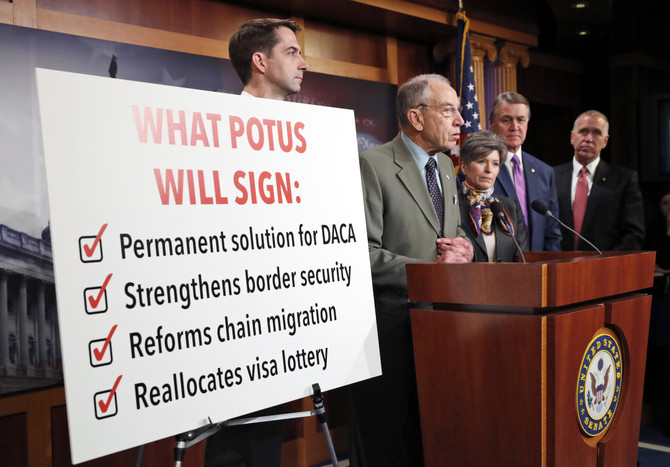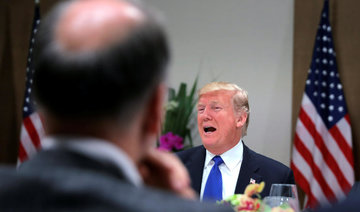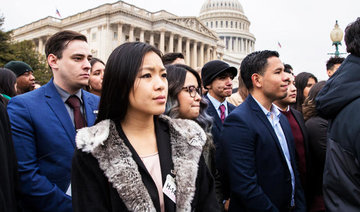WASHINGTON: A group of senators reached a bipartisan agreement aimed at balancing Democrats’ fight to offer citizenship to young “Dreamer” immigrants with President Donald Trump’s demands for billions to build his coveted border wall with Mexico.
Though the compromise was announced Wednesday by 16 senators with centrist views on the issue and was winning support from many Democrats, it faced an uncertain fate. Leaders were trying to schedule votes on that plan and three other immigration proposals for Thursday, which they hoped would bring the chamber’s showdown over the hot-button issue to a close.
While not specifically mentioning the bipartisan pact, Trump urged lawmakers to oppose any plan that doesn’t meet his more stringent demands, which include curbs on legal immigration and the abolition of a visa lottery. The Senate’s No. 2 Republican, John Cornyn of Texas, warned that lawmakers need to address Trump’s entire proposal, saying, “We need to take the president seriously.”
There were also qualms among Democrats. The party’s No. 2 Senate leader, Dick Durbin of Illinois, said some Democrats had “serious issues” with parts of the plan. Those concerns focused on its spending for Trump’s wall and its bar against Dreamers sponsoring their parents for legal residency.
“We’re not there yet,” Durbin said of the 60 votes the proposal would need for approval.
So far, no other proposals from either side seem able to do that. Republicans control the chamber 51-49, though Sen. John McCain, R-Arizona, has missed the last several weeks while battling cancer.
The bipartisan measure’s sponsors included eight GOP senators. That meant just three more Republicans would be needed for it to prevail if it is backed by all 47 Democrats and the two independents who usually support them.
The compromise emerged as senators spent a third day of debate largely as they spent the first two — with the chamber floor mostly empty. Other than an initial roll call allowing formal debate to begin, there have been no other votes while party leaders talk behind the scenes about scheduling votes on specific proposals.
The centrist proposal was produced by a group led by Sens. Susan Collins, R-Maine, and Joe Manchin, D-W.Virginia, that spent weeks seeking middle ground.
It would grant a 10- to 12-year route to citizenship for 1.8 million Dreamers, participants said.
That’s the same number Trump has suggested helping with his own wider-ranging but more restrictive proposal. Dreamers are young immigrants who were brought to the US illegally as children and still have no permanent protection from deportation.
The plan would provide $25 billion over a decade, $2.5 billion annually, for a wall and other border security measures, the same total Trump has requested. It would bar Dreamers from sponsoring their parents for citizenship, far narrower than Trump’s proposal to prevent all legal immigrants from bringing parents and siblings to the US
The moderates’ measure does not alter a lottery that distributes about 55,000 visas annually to people from diverse countries. Trump has proposed ending it and redistributing its visas to other immigrants, including some who are admitted based on job skills, not family ties.
“The diversity lottery is kind of toxic politically because of some of the things said by the president,” said Sen. Lindsey Graham, R-S.C., a reference to a vulgar description Trump used for African countries during a discussion of immigration.
The White House issued a written statement by Trump urging senators to back his bill and “oppose any legislation that fails to fulfill” his demands. But the statement did not say Trump would veto a bill that fell short of them.
A GOP measure tracking Trump’s proposal and backed by McConnell has been introduced and was expected to receive a vote. Few expect it to attract 60 votes, but Sen. Mike Rounds, R-S.D., said he believed the bipartisan proposal could.
If that happens, Rounds said, “We’ll allow the president to determine whether or not it moves in the direction that he wants.”
Senate Minority Leader Chuck Schumer, D-N.Y., indirectly embraced the bipartisan plan, saying, “Each side has had to give a great deal, but we are closer than we have ever been to passing something in the Senate to help the Dreamers.”
Also in play is a more modest plan by McCain and Sen. Chris Coons, D-Delaware It would let many Dreamers qualify for permanent residency and direct federal agencies to more effectively control the border by 2020. But it doesn’t offer a special citizenship pathway for Dreamers, raise border security funds or make sweeping changes in legal immigration rules.
The White House said it opposes the McCain-Coons plan, saying it would “increase illegal immigration” and cause other problems.
Another vote will be taken on a proposal by Sen. Pat Toomey, R-Pennsylvania, that would add language blocking federal grants to “sanctuary cities,” communities that don’t cooperate with federal efforts to enforce immigration laws. The amendment is considered sure to lose.


Bipartisan US immigration pact among several senate proposals
Bipartisan US immigration pact among several senate proposals

Four migrants dead, 10 missing off Libyan coast: UN

- “31 were on board. 17 survived. Others are still missing,” UNHCR said on Facebook, without giving further details about their nationalities
TRIPOLI: Four migrants have died at sea and 10 are missing after an incident involving a boat off the coast of Tobruk, in eastern Libya, the UN refugee agency (UNHCR) announced Sunday.
“31 were on board. 17 survived. Others are still missing,” UNHCR said on Facebook, without giving further details about their nationalities.
“People risk the sea when war leaves them no safe way out... Expand safe and legal pathways,” it added.
© 2026 SAUDI RESEARCH & PUBLISHING COMPANY, All Rights Reserved And subject to Terms of Use Agreement.














